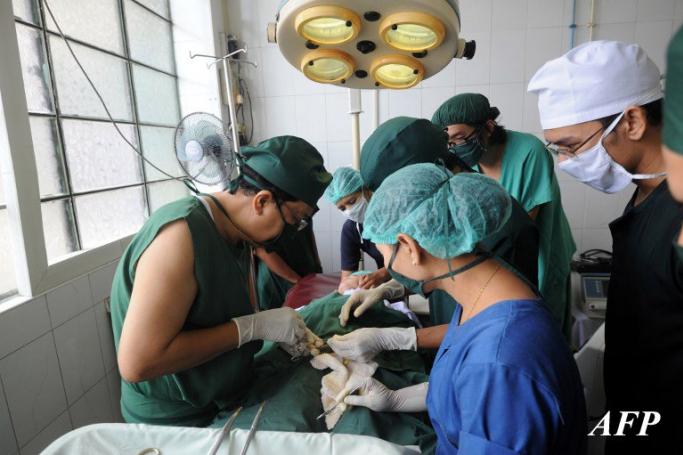Plans to open a psychology clinic and training centre, the first of its kind in Myanmar, at the Psychology Department of Yangon University are going ahead despite a lack of funding from local or foreign donors.
Dr Aung Myint, a visiting professor at the University of Yangon, is overseeing the project. He said US$5,000 has been donated so far by the German charity UmverteilenSiftung, but more money is needed to pay for the conversion of classrooms into private consulting rooms. The clinic will be for the public, with a nominal fee for consultations. The rooms will be fitted with video recording equipment and monitors so that students and teachers can review and discuss cases together, with the consent of the patients.
“Up until now we’ve been seeing people in here,” said Dr Aung Myint, referring to the small partitioned area of a classroom where we were sitting. “I’ve been using my old fashioned DV8 camera and my daughter’s Zoom recorder to record sessions.”
Myanmar’s mental health sector is lacking in resources. It receives only 0.03% of total health care expenditure. Health care expenditure totals only 1.8% of GDP while military expenditure accounts for 4.3% of GDP.
Initially the clinic was to incorporate 11 converted classrooms. However, this has been scaled back to five for the foreseeable future with only $5,000 of a needed $15,500 having been donated. Going through internal channels has proven difficult with no support from the government or the university.
“I didn’t get the support from the university because it’s still not independent. It has taken me one year to get the verbal approval from the recently retired director that we may seek funding from outside sources… We tried all sorts of tricks, like naming it a laboratory so the university would have to pay for it. It didn’t work,” said Dr Aung Myint.
In a country where palliative care is more prevalent than other methods of treatment for mental health disorders the clinic aims to provide primary treatments for mild to severe disorders, secondary training and education, and tertiary preventative programmes.
“Only when it becomes severe do you need medicine to palliate to the manageable level. Root causes are complex, not just your genes, not just your serotonin, it’s a lot more than physicians can [easily]diagnose,” said Dr Aung Myint.
According to the 2006 WHO Report into the mental health system in Myanmar, the most recent comprehensive study of its type, Myanmar has only four psychologists and 25 outpatient facilities but few of these facilities have the resources to provide extended counseling and psychotherapy services, instead having to refer cases to larger inpatient facilities such as the Yangon Mental Health Facility.
Years of living under oppressive military rule has contributed to levels of stress, anxiety, depression and PTSD amongst the population. Such disorders can lead to alcohol and drug abuse, and substance abuse can also be the cause of mental health disorders.
“There’s been 50 odd years of incremental stresses...people lose their human ethics, all the ethical codes have deteriorated because of the poverty issue. Factors like food security is an important term within developing countries and war-torn areas,” said Dr Aung Myint.
The WHO 2006 report made key recommendations into areas of improvement. These included a call for training of and deployment of clinical psychologists in mental health, noting that an appropriate training course was currently being developed for clinical psychologists to address this issue.
But Dr Aung Myint said this has not happened. He hopes that the opening of the clinic and others like it in the future will raise awareness of the study of psychology in Myanmar. He says initiatives such as this will not be sustainable if there is no interest expressed by the local people.
“Psychology is not visibly popular….We need to popularise it a bit… If it was something different, something physically visible, something like AIDs disease prevention or malaria it might be different but psychological distress like PTSD aren’t glamourous,” he said.
Dr Aung Myint says construction of the facility will commence soon and hopes the renovation will be completed within two to three months.
“Hopefully we get more funding from somewhere...I know there are people out there who will be willing to donate,” he said.
This Article first appeared in the July 30, 2015 edition of Mizzima Weekly.
Mizzima Weekly is available in print in Yangon through Innwa Bookstore and through online subscription at www.mzineplus.com
You are viewing the old site.
Please update your bookmark to https://eng.mizzima.com.
Mizzima Weekly Magazine Issue...
14 December 2023
Spring Revolution Daily News f...
13 December 2023
New UK Burma sanctions welcome...
13 December 2023
Spring Revolution Daily News f...
12 December 2023
Spring Revolution Daily News f...
11 December 2023
Spring Revolution Daily News f...
08 December 2023
Spring Revolution Daily News f...
07 December 2023
Diaspora journalists increasin...
07 December 2023
Local Shan people call for their identity to be added to signboard












